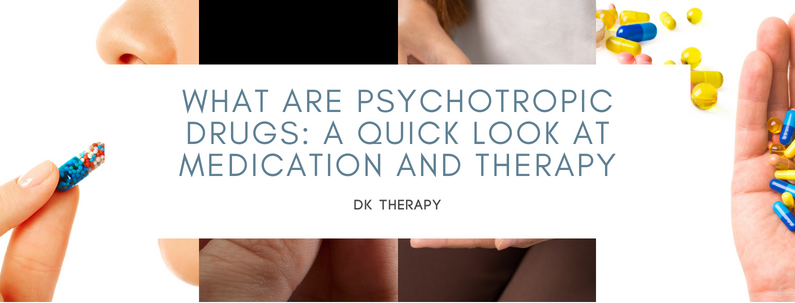
Psychotropic Drugs tend to have a bad reputation. The prefix “psycho” refers to the mind, and the word “drugs” means that they’re usually prescribed; obviously, that means they’re addictive, mind-altering drugs, right?
Wrong.
“Psychotropic Drug” is an umbrella term most commonly used for medications that help with mental illnesses. They are a highly diverse group of medications that aren’t necessarily for everyone and require serious discussion with a doctor before prescribing. So, why should you consider them alongside therapy?
What are Psychotropic Drugs?
Psychotropic drugs are medications designed to help people struggling with mental illness manage their symptoms. Since the term is so broad, psychotropic drugs include a variety of medications, including antidepressants, ADHD medications, antipsychotics, anti-anxiety medications, sleep aids, and more. These medications all have one thing in common: they affect the user’s mood, behavior, or perception.
Are they Addictive?
Since the term is so broad, we can’t just say that all psychotropic drugs are addictive. While many psychotropic drugs are often abused, obtained illegally, and are addictive, many are not. For example, the ADHD medication Ritalin is highly addictive in the same way morphine is– overuse can cause addiction problems, especially in people who aren’t prescribed the medication. Thus, prescriptions are monitored to ensure that only the person prescribed the medication takes their required dosage.
How do They Work?

African American doctor hands a prescription medication bottle to a female patient. The doctor is holding the patient’s chart.
Psychotropic drugs alter the user’s mood or perception by changing how the brain reacts to various hormones. For example, SSRIs are a common antidepressant and anti-anxiety medication. They function by blocking serotonin receptors in the brain from taking back serotonin released into the brain, leaving people with depression with some extra serotonin floating around. Since people with depression tend to have lower levels of “happy” hormones like serotonin, dopamine, and norepinephrine, these medications ensure that the user has enough to get through their day.
It’s important to note that psychotropic medications aren’t a cure for mental illness. While SSRIs provide patients with slightly higher serotonin levels, they don’t stop them from having depressive thoughts.
Signs You Should Look into Medication:
If you’re already in therapy and are experiencing these problems, consider talking to your therapist about them to discuss other options alongside therapy:
You Feel Like You Can’t Use Your Skills
Skills learned in therapies like CBT and DBT are great for getting out of crises and managing negative behaviors or emotions. However, it can be hard for someone mid-panic attack to remember their skills– if you feel as though you aren’t able to use what you’ve learned in real life, it’s time to talk to your therapist.
You have Other Symptoms that Inhibit Your Daily Life
Not all symptoms of mental health disorders are thoughts of worthlessness or extreme anxiety. Sometimes, mental health problems manifest in chronic pain, a general lack of energy, too much energy, or an extreme feeling of dread. If you’re constantly grappling with these issues, tell your therapist about them as soon as possible.
You Can’t Get Any Work Done (No Matter How Hard You Try)
The inability to focus is a common symptom among many mood disorders and other mental health complications. Tell your therapist immediately if you’re having trouble focusing, especially while in therapy.
Meds vs. Therapy
The “medication vs. therapy” debate is an old, tired conversation that ultimately answers nothing because there isn’t a clear answer to which practice is better. It’s true medication doesn’t work for everyone, but for some people, it can help a lot. However, medication can’t do much on its own without the skills necessary to handle intrusive thoughts and behaviors. The American Psychiatric Association recommends a combination of medication and therapy instead of just one or the other.
Finding the Right Medication
Part of the struggle with prescribed medication is finding one that works best for you. Psychotropic medications aren’t designed to “cure” your depression or anxiety; they’re meant to alleviate some of the symptoms that make it difficult for you to use what you’ve learned in therapy. When you talk to your doctor or psychiatrist about medication, chances are that you’ll undergo several months of trial and error, adjusting medication type and dosage to find something that works best with your physical needs. Many of these drugs aren’t instantaneous either– some take several weeks of regular use before you can spot any significant changes.
If you’re considering medication alongside therapy, speak with your doctor as soon as possible. If you haven’t tried regular therapy sessions, why not give us a call? Together, we can work through the hardest parts of your life and build the skills necessary to handle anything that comes your way.




